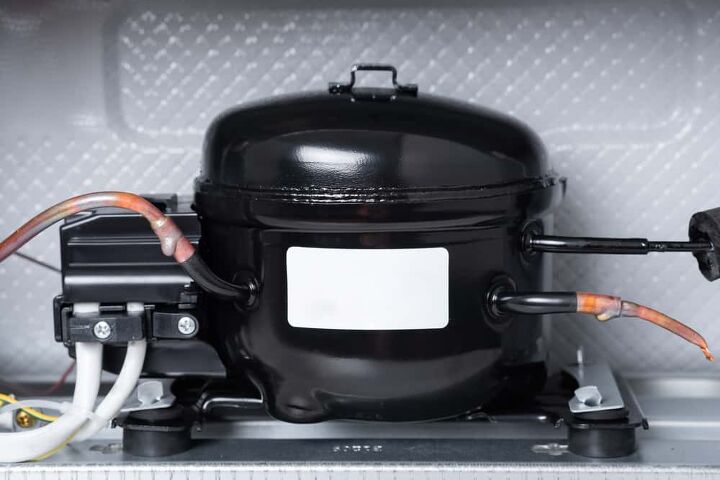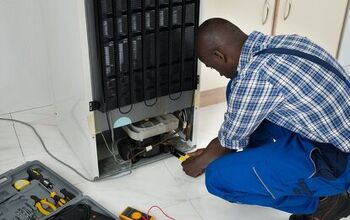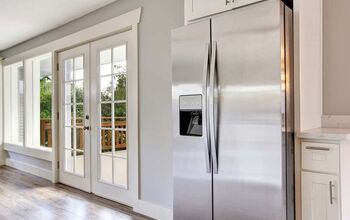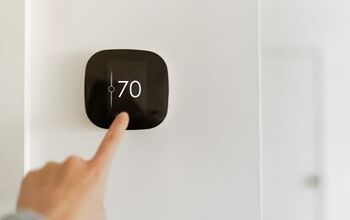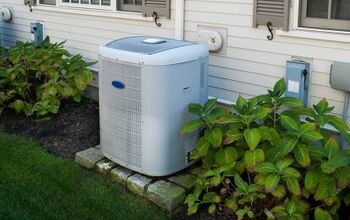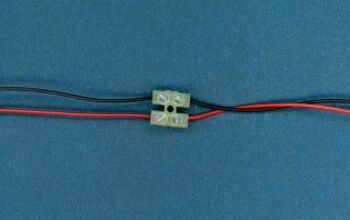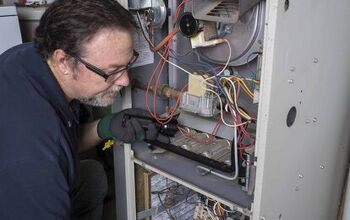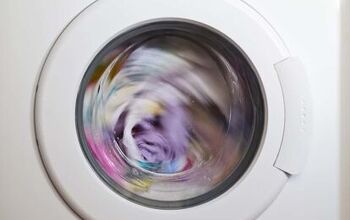Is Your Refrigerator Compressor Hot? (Possible Causes & Fixes)

Houses make all kinds of sounds. We find some of them to be comforting– cabinets closing, garage doors opening, even pipes creaking. But some sounds can be alarming.
Should your refrigerator really be making so much noise? All that whirring, dripping, and humming. These sounds are completely normal for a working refrigerator, but excessive buzzing could be a bad sign. Check the temperature of the back of your fridge. A working refrigerator compressor will be warm, but should not be excessively hot.
So, if your refrigerator compressor is excessively hot, the most common reasons this happens is the cooling system lacks refrigerant, the refrigerator’s internal temperature is incorrect, the condenser coils are dirty, the condenser fan is broken, there’s inadequate ventilation, a bad compressor relay, or you have a faulty auto defrost system.
With that said, let’s take a look at each of these reasons in detail and learn just how hot a refrigerator compressor can get before it’s considered unsafe.
Do You Need Appliance Repair Services?
Get free, zero-commitment quotes from pro contractors near you.

Should a Refrigerator Compressor Be Hot?
It’s normal for the back of your refrigerator to be warm or hot to the touch. Expelling heat is just part of the refrigeration process! This process can sometimes cause the compressor to get up to 300 degrees Fahrenheit.
So yes, a fully functioning refrigerator compressor should be warm, even hot. But it’s important to differentiate between a safe working temperature and symptoms of an underlying problem.
How Hot is Too Hot?
Although some refrigerator compressors can reach temperatures of up to 300 degrees Fahrenheit during regular operation, important components of the compressor will begin to break down at around 320 degrees.
First, the refrigerant will begin to deteriorate. The refrigerant is a working fluid that enters the compressor as a pressurized vapor and circulates at or below the inside temperature of the refrigerator. Once the refrigerant breaks down, it is no longer able to cool your refrigerator to the desired temperature. Lack of refrigerant can quickly lead to compromised food safety.
At around 350 degrees Fahrenheit, the lubricant will break down. Without lubrication, the compressor will quickly overheat. While an overheated compressor may still be working, it can lead to costly repairs. To avoid costly repairs, ensure that your refrigerator compressor does not exceed 300 degrees Fahrenheit.
What to Do When Your Refrigerator Compressor is Too Hot
If you’ve determined that your refrigerator compressor is running a little hotter than it should, but there are no visible signs (like burn marks on your walls), you may have some luck addressing the problem yourself. First, unplug the appliance and let it defrost on its own for a couple hours. Though, make sure that you find a temporary storage spot for all of your food that is stored inside.
Quick Tip: If you don’t have a second refrigerator in your home, you can place the food in a cooler with ice.
Once your refrigerator has had enough time to defrost completely, clean the coils at the back of the machine and remove and dust, dirt, or debris collecting around the compressor. Then, plug your fridge back in and give it about an hour or two to cool back to the proper temperature. If you find that the compressor is now functioning normal and is no longer overheated, you can proceed with placing your food back inside.
Though, if this does not correct the problem, the overheating is likely being caused by something else.
What Makes a Refrigerator Compressor Overheat?
When a refrigerator stops working, it is most likely due to an overheated compressor. Several factors could be responsible for an overheated compressor. This guide will help you to determine whether you can fix your overheating compressor on your own and when to contact a professional.
1. Lack of Refrigerant
A common cause of an overheating compressor is the lack of refrigerant. Freon is a commonly known refrigerant, although it has not been used in new refrigerators since 1994. Refrigerant is an essential part of your refrigerator’s cooling system. Your refrigerator compressor takes the refrigerant, pressurizes it, and then circulates it throughout a closed-loop system at the desired temperature.
If the refrigerant has been compromised due to a leak or high temperatures, the compressor will be forced to work extra hard to continue operating. As the compressor works harder, it will invariably overheat.
To address any leaks or adjust the levels of refrigerant, it’s best to contact a licensed professional. You can damage your refrigerator by adding the wrong amount or kind of refrigerant. You could also violate the warranty by attempting to troubleshoot your appliance. Liquid refrigerants can also be toxic or dangerous under certain conditions.
2. Incorrect Internal Temperature
Setting your refrigerator’s inside temperature too low can cause the compressor to overheat. If the refrigerator’s temperature is set too low, the compressor will be forced to work harder, eventually causing it to overheat.
Fortunately, you can keep your refrigerator compressor from overheating by adjusting the inside temperature yourself. Set your refrigerator’s internal temperature to between 37 – 38 degrees Fahrenheit. If the inside temperature is lower than 35 degrees, you could be overworking your refrigerator compressor and causing it to overheat. If the temperature is higher than 40 degrees, you could be promoting bacterial growth on your food.
Similarly, if your refrigerator’s internal thermostat fails, it will signal the compressor to keep working when it doesn’t need to, eventually causing it to overheat. Since the thermostat often triggers the compressor to turn on or off, a faulty thermostat will need to be replaced by a professional.
3. Dirty Condenser Coils
Your refrigerator compressor could also be overheating due to the condenser coils becoming clogged or dirty. The condenser coils introduce the refrigerant into the cooling system, and it is common for the coils to attract pet hair, dust, and other debris. While dirty coils are normal with regular use, cleaning them is an easy way to troubleshoot an overheating compressor.
To keep your compressor operating properly, you can clean the condenser coils yourself. Move the refrigerator away from the wall and unplug it. Once the refrigerator is unplugged and the compressor is no longer too hot to touch, you can remove the bottom back panel with a screwdriver. If the condenser fan is covered in dust, you can use a vacuum cleaner or paintbrush to remove it.
4. Broken Condenser Fan
Similar to dirty compressor coils, a dirty condenser fan can cause the compressor to overheat by limiting the amount of hot air that is able to escape. If the condenser fan is broken, heat will become trapped in the compressor and cause it to overheat. You can clean a dirty condenser fan with compressed air or a vacuum cleaner, but you may have to replace the compressor if the condenser fan is broken.
5. Inadequate Ventilation
If the back of the refrigerator is too close to the wall or its surroundings, it will not have adequate ventilation. If the hot air coming out of the discharge line cannot escape, the compressor will overheat.
To avoid overheating, position your refrigerator out of direct sunlight and leave 1-2 inches of space between the back of the refrigerator and the wall.
6. Bad Compressor Relay
A refrigerator compressor relay is a protective device that helps get the compressor up to working speed. If you suspect that the refrigerator compressor relay is bad, you can easily check it yourself. Once you’ve located the compressor on the back of the refrigerator, unplug the start relay from the unit and shake it. If you can hear rattling, the relay is bad and will need to be replaced. If you don’t hear a rattle, the relay is in good condition and the issue may be with the compressor itself.
7. Faulty Auto Defrost System
While a fridge or freezer with an auto-defrost feature can be very helpful, it can cause problems when it’s not working properly. When the feature is functioning properly, you don’t have to worry about periodic defrosting sessions that require you to empty out the entire appliance.
Though, when it stops functioning, one of the main problems that can occur is causing your refrigerator compressor to run too hot. As a result, the cooling process will no longer be able to operate as well. Unfortunately, this is not always an easy fix and usually requires professional remediation.
Is It Dangerous When Your Refrigerator Compressor is Too Hot?
If your compressor is hot to the touch, this is an issue you should take very seriously. For instance, if the compressor is so hot that it has caused scorch marks to form on the wall behind your appliance, you need to disconnect the power source immediately. This presents a major fire hazard and is a dangerous to you, your family, and your home.
Additional Safety Considerations
Don’t risk it when it comes to food safety. If you suspect that your refrigerator’s cooling system has stopped working, throw away any compromised food items. Raw meat, cooked meat, dairy products, and certain fruits and vegetables are prone to bacterial growth when exposed to temperatures above 40 degrees Fahrenheit.
Before troubleshooting your refrigerator compressor, make sure that your refrigerator is unplugged and off. Use caution when coming into contact with refrigerator components, as they could be hot.
How to Measure the Temperature
If you are concerned that your refrigerator compressor is too hot, you can measure the temperature yourself. It may be difficult to measure the actual inside temperature of your compressor, but you can measure the temperature of the compressor’s discharge line. The discharge line will be located near the compressor and will be warm to the touch.
Generally, by the time the hot air is discharged from this tube, it’s 50 to 75 degrees lower than inside the compressor.
Unplug your refrigerator and place a thermometer on the tubing. Record the temperature. Once you have the temperature of the tubing, add 75 to find the inside temperature of the compressor. If the inside temperature is above 300 degrees, your refrigerator compressor could be overheating.
When to Contact a Professional
If your refrigerator compressor is hot because of a leak, lack of refrigerant, or a faulty thermostat, it’s time to contact a licensed professional.
It’s normal for fridge compressors to make a soft humming, but if it’s loud enough to be heard from the next room, you should contact a licensed professional. If your refrigerator compressor is making a clicking noise, it could be the compressor shutting off as it overheats. Try cleaning the condenser coils first, but if the compressor continues to click, you may need to have a professional replace the compressor.
Do You Need Appliance Repair Services?
Get free, zero-commitment quotes from pro contractors near you.

Related Questions
What are the signs of a bad refrigerator compressor?
Regardless of whether you have a Whirlpool, Kenmore, Amana, or Frigidaire, there’s an easy way to diagnose whether your compressor is working properly. Move your appliance away from the wall. You should be able to hear a steady humming sound. If you can’t hear a motor, it’s likely that your compressor has stopped working.
Can a refrigerator compressor explode?
Yes, although rare, a refrigerator compressor could explode under the right conditions. When the gas that cools the fridge becomes trapped inside the compressor, pressure builds. If unaddressed, a clogged compressor could lead to an explosion.
Is it worth it to replace a refrigerator compressor?
If you are considering replacing your refrigerator compressor, it’s a good idea to find out the age of your refrigerator. While most refrigerators will last 10 to 15 years, and the cost of a new compressor is half the price of a new refrigerator.If you are considering replacing your refrigerator compressor, it’s a good idea to find out how old your fridge is. Most refrigerators will last 10 to 15 years. We would not recommend investing in a new compressor if your fridge is nearing the end of its life. A new refrigerator compressor can be half the price of a new refrigerator, so choose the solution that is right for you.

HK Sloan is a freelance writer currently covering DIY Home Improvement, Health, and Lifestyle. Sloan is passionate about improving situations for less, whether it be working on mind, body, or home.
More by HK Sloan



